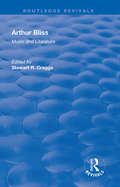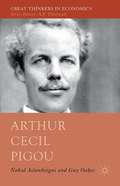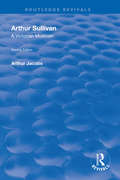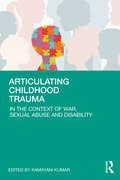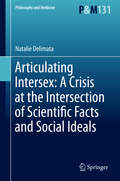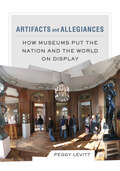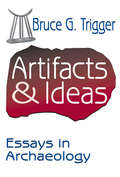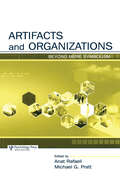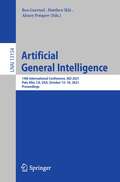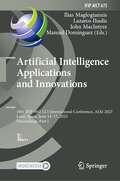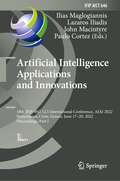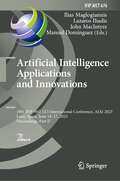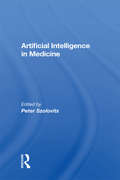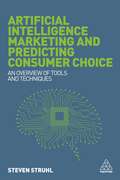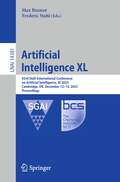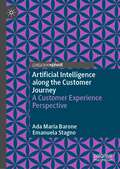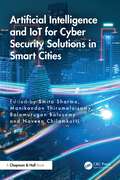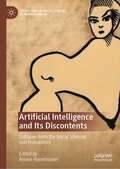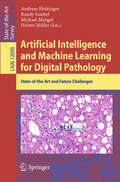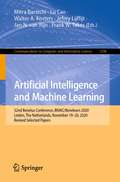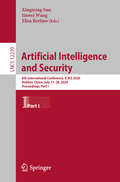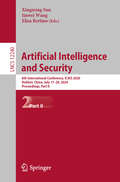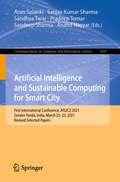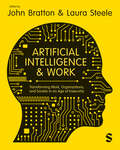- Table View
- List View
Arte Programmata: Freedom, Control, and the Computer in 1960s Italy
by Lindsay CaplanTracing the evolution of the Italian avant-garde&’s pioneering experiments with art and technology and their subversion of freedom and control In postwar Italy, a group of visionary artists used emergent computer technologies as both tools of artistic production and a means to reconceptualize the dynamic interrelation between individual freedom and collectivity. Working contrary to assumptions that the rigid, structural nature of programming limits subjectivity, this book traces the multifaceted practices of these groundbreaking artists and their conviction that technology could provide the conditions for a liberated social life.Situating their developments within the context of the Cold War and the ensuing crisis among the Italian left, Arte Programmata describes how Italy&’s distinctive political climate fueled the group&’s engagement with computers, cybernetics, and information theory. Creating a broad range of immersive environments, kinetic sculptures, domestic home goods, and other multimedia art and design works, artists such as Bruno Munari, Enzo Mari, and others looked to the conceptual frameworks provided by this new technology to envision a way out of the ideological impasses of the age.Showcasing the ingenuity of Italy&’s earliest computer-based art, this study highlights its distinguishing characteristics while also exploring concurrent developments across the globe. Centered on the relationships between art, technology, and politics, Arte Programmata considers an important antecedent to the digital age.
Arthur Bliss: Music and Literature
by Stewart R. CraggsThis title was first published in 2002. This volume of essays seeks to reflect aspects of the life and work of Arthur Bliss, Master of the Queen's Music. Though each is self-contained, the editor has attempted to keep a theme running throughout. Looking beyond surface impressions is an attitude constantly expressed.
Arthur Cecil Pigou (Great Thinkers In Economics Ser.)
by Nahid Aslanbeigui Guy OakesThe British economist Arthur Cecil Pigou (1877-59) reconceptualized economics as a theory of economic welfare and a logic of policy analysis. Misconceptions of his work abound. This book, an essay in demystification and the first reading of the entire Pigouvian oeuvre, stresses his pragmatic and historicist premises.
Arthur Sullivan: A Victorian Musician (Routledge Revivals)
by Arthur JacobsPublished in 1992. This is a revised, enlarged edition of a book which on its original appearance in 1984 was hailed as a landmark in the study of Victorian musical life. It presents the figure of Sir Arthur Sullivan (1842-1990) not only as the celebrated co-creator of light operas with W.S Gilbert, but as a composer of all kinds of music from symphony and concerto to ballads such as ‘The Lost Chord’ and hymns such as ‘Onward, Christian Soldiers’. A prominent public life, with a knighthood in 1883, is contrasted with an unconventional private life involving a liaison of almost thirty years with an American living in London, Mary Frances Ronalds. The author’s access to Sullivan’s diary held by Yale University and to letters and other documents at the Pierpont Morgan library in New York gives this book both a unique authority and a deep human understanding. A new chapter updates research to the 150th anniversary of the composer’s birth, 1992, and incorporates music examples.
Articulating Childhood Trauma: In the Context of War, Sexual Abuse and Disability
by Kamayani KumarThe volume addresses the pertinent need to examine childhood trauma revolving around themes of war, sexual abuse, and disability. Drawing narratives from spatial, temporal, and cultural contexts, the book analyses how conflict, abuse, domestic violence, contours of gender construction, and narratives of ableism affect a child’s transactions with society. While exploring complex manifestations of children’s experience of trauma, the volume seeks to understand the issues related to translatability/representation, of trauma bearing in mind the fact that children often lack the language to express their sense of loss. The book in its study of childhood trauma does a close exegesis of select literary pieces, drawings done by children, memoirs, and graphic narratives.Academicians and research scholars from the disciplines of childhood studies, trauma studies, resilience studies, visual studies, gender studies, cultural studies, disability studies, and film studies stand to benefit from this volume. The ideas that have been expressed in this volume will richly contribute towards further research and scholarship in this domain.
Articulating Intersex: A Crisis at the Intersection of Scientific Facts and Social Ideals (Philosophy and Medicine #131)
by Natalie DelimataThis book explores the ethical dilemma clinicians may face when disclosing a diagnosis of atypical sex. The moment of disclosure reveals an epistemic incompatibility between scientific fact and social meaning in relation to sex. Attempting to assess the bio-psychosocial implications of this dilemma highlights a complex historic antagonism between fact and meaning making satisfactory resolution of this dilemma difficult. Drawing on David Hume, WVO Quine and Michel Foucault the author presents an integrative model, which views scientific fact and social meaning as codetermining threads in one fabric of knowledge. From this epistemic perspective, the ethical dilemma is understood as a tear in the fabric signifying a rupturing of ontological integrity. To mend this tear and resolve the ethical dilemma three metaphysical perspectives are considered: essentialism, naturalism and emergentism. The book’s unique features include: an exploration of the impact of diagnostic disclosure on people with atypical sex (intersex); a synthesis of the epistemic perspectives of social and natural science facilitating interdisciplinary collaboration; a critical evaluation of three metaphysical perspectives on atypical sex (intersex); the application of Hume’s epistemological and moral distinctions to contemporary biomedicine and bioethics. The book’s target audience includes academics, students and professionals whose work intersects the natural and social sciences, and individuals interested in the metaphysics, epistemology and meta-ethics of sex.
Artifacts and Allegiances: How Museums Put the Nation and the World on Display
by Peggy LevittWhat can we learn about nationalism by looking at a country’s cultural institutions? How do the history and culture of particular cities help explain how museums represent diversity? Artifacts and Allegiances takes us around the world to tell the compelling story of how museums today are making sense of immigration and globalization. Based on firsthand conversations with museum directors, curators, and policymakers; descriptions of current and future exhibitions; and inside stories about the famous paintings and iconic objects that define collections across the globe, this work provides a close-up view of how different kinds of institutions balance nationalism and cosmopolitanism. By comparing museums in Europe, the United States, Asia, and the Middle East, Peggy Levitt offers a fresh perspective on the role of the museum in shaping citizens. Taken together, these accounts tell the fascinating story of a sea change underway in the museum world at large.
Artifacts and Ideas: Essays in Archaeology
by Bruce G. TriggerPrehistoric archaeologists cannot observe their human subjects nor can they directly access their subjects' ideas. Both must be inferred from the remnants of the material objects they made and used. In recent decades this incontrovertible fact has encouraged partisan approaches to the history and method of archaeology. An empirical discipline emphasizing data, classification, and chronology has given way to a behaviorist approach that interprets finds as products of ecologically adaptive strategies, and to a postmodern alternative that relies on an idealist, cultural-relativist epistemology based on belief and cultural traditions.In Artifacts and Ideas, Bruce G. Trigger challenges all partisan versions of recent developments in archaeology, while remaining committed to understanding the past from a social science perspective. Over 30 years, Trigger has addressed fundamental epistemological issues, and opposed the influence of narrow theoretical and ideological commitments on archaeological interpretation since the 1960s. Trigger encourages a relativistic understanding of archaeological interpretation. Yet as post-processual archaeology, influenced by postmodernism, became increasingly influential, Trigger countered nihilistic subjectivism by laying greater emphasis on how in the long run the constraints of evidence could be expected to produce a more comprehensive and objective understanding of the past.In recent years Trigger has argued that while all human behavior is culturally mediated, the capacity for such mediation has evolved as a flexible and highly efficient means by which humans adapt to a world that exists independently of their will. Trigger agrees that a complete understanding of what has shaped the archaeological record requires knowledge both of past beliefs and of human behavior. He knows also that one must understand humans as organisms with biologically grounded drives, emotions, and means of understanding. Likewise, even in the absence of data supplied in a linguistic format by texts and oral traditions, at least some of the more ecologically adaptive forms of human behavior and some general patterns of belief that display cross-cultural uniformity will be susceptible to archaeological analysis.Advocating a realist epistemology and a materialist ontology, Artifacts and Ideas offers an illuminating guide to the present state of the discipline as well as to how archaeology can best achieve its goals.
Artifacts and Organizations: Beyond Mere Symbolism (Organization and Management Series)
by Anat Rafaeli Michael G. PrattArtifacts in organizations are ubiquitous but often overlooked. The chapters in this book illustrate that artifacts are everywhere in organizational life. They prevail in how offices are decorated, language is used, business cards are designed, and office cartoons are displayed. In addition, artifacts can be seen in the name of an organization and its employees, products, buildings, processes, and contracts, and they represent people, organizations, and professions.Artifacts and Organizations suggests that artifacts are neither superficial nor pertinent only to organizational culture. They are relevant to a rich and diverse set of organizational processes within and across multiple levels of analysis. Artifacts are shown to be integral to identity, sense-giving and sense-making processes, interpretation and negotiation, legitimacy, and branding. The book seeks to communicate that artifacts are often much more than what is currently recognized in organizational research. The four sections of this edited volume address various aspects of what is known about and known through artifacts. Together, the full set of chapters challenge the field to move beyond a narrow conceptualization and understanding of artifacts in organizations.This book leads students to embrace the full complexity and richness of artifacts. In addition, the text seeks to inspire those who focus on artifacts as symbols to delve deeper into the complexities of artifacts-in-use, for individuals, organizations, and institutions.
Artificial General Intelligence: 14th International Conference, AGI 2021, Palo Alto, CA, USA, October 15–18, 2021, Proceedings (Lecture Notes in Computer Science #13154)
by Ben Goertzel Alexey Potapov Matthew IkléThis book constitutes the refereed proceedings of the 14th International Conference on Artificial General Intelligence, AGI 2021, held as a hybrid event in San Francisco, CA, USA, in October 2021.The 36 full papers presented in this book were carefully reviewed and selected from 50 submissions. The papers cover topics from foundations of AGI, to AGI approaches and AGI ethics, to the roles of systems biology, goal generation, and learning systems, and so much more.
Artificial Intelligence Applications and Innovations: 19th IFIP WG 12.5 International Conference, AIAI 2023, León, Spain, June 14–17, 2023, Proceedings, Part I (IFIP Advances in Information and Communication Technology #675)
by Lazaros Iliadis Ilias Maglogiannis John MacIntyre Manuel DominguezThis two-volume set of IFIP-AICT 675 and 676 constitutes the refereed proceedings of the 19th IFIP WG 12.5 International Conference on Artificial Intelligence Applications and Innovations, AIAI 2023, held in León, Spain, during June 14–17, 2023. This event was held in hybrid mode. The 75 regular papers and 17 short papers presented in this two-volume set were carefully reviewed and selected from 185 submissions. The papers cover the following topics: Deep Learning (Reinforcement/Recurrent Gradient Boosting/Adversarial); Agents/Case Based Reasoning/Sentiment Analysis; Biomedical - Image Analysis; CNN - Convolutional Neural Networks YOLO CNN; Cyber Security/Anomaly Detection; Explainable AI/Social Impact of AI; Graph Neural Networks/Constraint Programming; IoT/Fuzzy Modeling/Augmented Reality; LEARNING (Active-AutoEncoders-Federated); Machine Learning; Natural Language; Optimization-Genetic Programming; Robotics; Spiking NN; and Text Mining /Transfer Learning.
Artificial Intelligence Applications and Innovations: 18th IFIP WG 12.5 International Conference, AIAI 2022, Hersonissos, Crete, Greece, June 17–20, 2022, Proceedings, Part I (IFIP Advances in Information and Communication Technology #646)
by Paulo Cortez Lazaros Iliadis Ilias Maglogiannis John MacintyreThis book constitutes the refereed proceedings of five International Workshops held as parallel events of the 18th IFIP WG 12.5 International Conference on Artificial Intelligence Applications and Innovations, AIAI 2022, virtually and in Hersonissos, Crete, Greece, in June 2022: the 11th Mining Humanistic Data Workshop (MHDW 2022); the 7th 5G-Putting Intelligence to the Network Edge Workshop (5G-PINE 2022); the 1st workshop on AI in Energy, Building and Micro-Grids (AIBMG 2022); the 1st Workshop/Special Session on Machine Learning and Big Data in Health Care (ML@HC 2022); and the 2nd Workshop on Artificial Intelligence in Biomedical Engineering and Informatics (AIBEI 2022). The 35 full papers presented at these workshops were carefully reviewed and selected from 74 submissions.
Artificial Intelligence Applications and Innovations: 19th IFIP WG 12.5 International Conference, AIAI 2023, León, Spain, June 14–17, 2023, Proceedings, Part II (IFIP Advances in Information and Communication Technology #676)
by Lazaros Iliadis Ilias Maglogiannis John MacIntyre Manuel DominguezThis two-volume set of IFIP-AICT 675 and 676 constitutes the refereed proceedings of the 19th IFIP WG 12.5 International Conference on Artificial Intelligence Applications and Innovations, AIAI 2023, held in León, Spain, during June 14–17, 2023. This event was held in hybrid mode.The 75 regular papers and 17 short papers presented in this two-volume set were carefully reviewed and selected from 185 submissions. The papers cover the following topics: Deep Learning (Reinforcement/Recurrent Gradient Boosting/Adversarial); Agents/Case Based Reasoning/Sentiment Analysis; Biomedical - Image Analysis; CNN - Convolutional Neural Networks YOLO CNN; Cyber Security/Anomaly Detection; Explainable AI/Social Impact of AI; Graph Neural Networks/Constraint Programming; IoT/Fuzzy Modeling/Augmented Reality; LEARNING (Active-AutoEncoders-Federated); Machine Learning; Natural Language; Optimization-Genetic Programming; Robotics; Spiking NN; and Text Mining /Transfer Learning.
Artificial Intelligence In Medicine
by Peter SzolovitsThis book introduces the field of artificial intelligence in medicine, a new research area that combines sophisticated representational and computing techniques with the insights of expert physicians to produce tools for improving health care. An introductory chapter describes the historical and technical foundations of the work and provides an overview of the current state of the art and research directions. The authors then describe four prototype computer programs that tackle difficult clinical problems in a manner similar to that of an expert physician. The programs presented are internist, a diagnostic aid that combines a large database of disease/manifestation associations with techniques for problem formulation; expert and the Glaucoma Program which use physiological models for the diagnosis and treatment of eye disease; mycin, a rule-based program for diagnosis and therapy selection for infectious diseases; and the Digitalis Therapy Advisor, which aids the physician in prescribing the right dose of the drug digitalis and also explains its actions.
Artificial Intelligence Marketing and Predicting Consumer Choice: An Overview of Tools and Techniques
by Dr Steven StruhlThe ability to predict consumer choice is a fundamental aspect to success for any business. In the context of artificial intelligence marketing, there are a wide array of predictive analytic techniques available to achieve this purpose, each with its own unique advantages and disadvantages. Artificial Intelligence Marketing and Predicting Consumer Choice serves to integrate these widely disparate approaches, and show the strengths, weaknesses, and best applications of each. It provides a bridge between the person who must apply or learn these problem-solving methods and the community of experts who do the actual analysis. It is also a practical and accessible guide to the many remarkable advances that have been recently made in this fascinating field.
Artificial Intelligence XL: 43rd SGAI International Conference on Artificial Intelligence, AI 2023, Cambridge, UK, December 12–14, 2023, Proceedings (Lecture Notes in Computer Science #14381)
by Max Bramer Frederic StahlThis book constitutes the refereed proceedings of the 43rd SGAI International Conference on Artificial Intelligence, AI 2023, held in Cambridge, UK, during December 12–14, 2023.The 27 full papers and 20 short papers included in this book are carefully reviewed and selected from 67 submissions. They were organized in topical sections as follows: Technical Papers: Speech and Natural Language Analysis, Image Analysis, Neural Nets, Case Based Reasoning and Short Technical Papers. Application Papers: Machine Learning Applications, Machine Vision Applications, Knowledge Discovery and Data Mining Applications, other AI Applications and Short Application Papers.
Artificial Intelligence along the Customer Journey: A Customer Experience Perspective
by Ada Maria Barone Emanuela StagnoThe development of several AI solutions has revolutionized the way in which consumers behave. Serving as a guide to the role that AI plays on different aspects of consumers’ life, this book provides a comprehensive understanding of the main artificial intelligence (AI) solutions available in the market. In particular, the authors adopt a customer experience approach to investigate how different AI technologies play a role at different stages of the customer journey (e.g., from pre-purchase to post-purchase decisions). Covering a range of technologies, such as augmented reality, voice assistants, chatbots and robots, readers will be able to learn which strategies and AI solutions are more effective at different stages of the customer journey.
Artificial Intelligence and IoT for Cyber Security Solutions in Smart Cities
by Naveen Chilamkurti Balamurugan Balusamy Smita Sharma Manikandan ThirumalaisamyThis book offers a comprehensive overview of the current state of cybersecurity in smart cities and explores how AI and IoT technologies can be used to address cybersecurity challenges. It discusses the potential of AI for threat detection, risk assessment, and incident response, as well as the use of IoT sensors for real-time monitoring and data analysis in the context of smart cities. It includes case studies from around the world to provide practical insights into the use of AI and IoT technologies for enhancing cybersecurity in different contexts and highlight the potential benefits of these technologies for improving the resilience and security of smart cities.Key Features: Studies the challenges of and offers relevant solutions to using AI and IoT technologies in cybersecurity in smart cities Examines the unique security risks faced by smart cities, including threats to critical infrastructure, data privacy and security, and the potential for large-scale cyber-attacks Offers practical solutions and case studies to be used to inform policy and practice in this rapidly evolving field Discusses the Fourth Industrial Revolution framework and how smart cities have been a significant part of this manufacturing paradigm Reviews aspects of Society 5.0 based on intelligent smart cities and sustainable issues for the cities of the future Postgraduate students and researchers in the departments of Computer Science, working in the areas of IoT and Smart Cities will find this book useful.
Artificial Intelligence and Its Discontents: Critiques from the Social Sciences and Humanities (Social and Cultural Studies of Robots and AI)
by Ariane HanemaayerOn what basis can we challenge Artificial Intelligence (AI) - its infusion, investment, and implementation across the globe? This book answers this question by drawing on a range of critical approaches from the social sciences and humanities, including posthumanism, ethics and human values, surveillance studies, Black feminism, and other strategies for social and political resistance. The authors analyse timely topics, including bias and language processing, responsibility and machine learning, COVID-19 and AI in health technologies, bio-AI and nanotechnology, digital ethics, AI and the gig economy, representations of AI in literature and culture, and many more. This book is for those who are currently working in the field of AI critique and disruption as well as in AI development and programming. It is also for those who want to learn more about how to doubt, question, challenge, reject, reform and otherwise reprise AI as it been practiced and promoted.
Artificial Intelligence and Machine Learning for Digital Pathology: State-of-the-Art and Future Challenges (Lecture Notes in Computer Science #12090)
by Andreas Holzinger Randy Goebel Michael Mengel Heimo MüllerData driven Artificial Intelligence (AI) and Machine Learning (ML) in digital pathology, radiology, and dermatology is very promising. In specific cases, for example, Deep Learning (DL), even exceeding human performance. However, in the context of medicine it is important for a human expert to verify the outcome. Consequently, there is a need for transparency and re-traceability of state-of-the-art solutions to make them usable for ethical responsible medical decision support. Moreover, big data is required for training, covering a wide spectrum of a variety of human diseases in different organ systems. These data sets must meet top-quality and regulatory criteria and must be well annotated for ML at patient-, sample-, and image-level. Here biobanks play a central and future role in providing large collections of high-quality, well-annotated samples and data. The main challenges are finding biobanks containing ‘‘fit-for-purpose’’ samples, providing quality related meta-data, gaining access to standardized medical data and annotations, and mass scanning of whole slides including efficient data management solutions.
Artificial Intelligence and Machine Learning: 32nd Benelux Conference, BNAIC/Benelearn 2020, Leiden, The Netherlands, November 19–20, 2020, Revised Selected Papers (Communications in Computer and Information Science #1398)
by Walter A. Kosters Frank W. Takes Jefrey Lijffijt Mitra Baratchi Lu Cao Jan N. van RijnThis book contains a selection of the best papers of the 32nd Benelux Conference on Artificial Intelligence, BNAIC/Benelearn 2020, held in Leiden, The Netherlands, in November 2020. Due to the COVID-19 pandemic the conference was held online. The 12 papers presented in this volume were carefully reviewed and selected from 41 regular submissions. They address various aspects of artificial intelligence such as natural language processing, agent technology, game theory, problem solving, machine learning, human-agent interaction, AI and education, and data analysis.The chapter 11 is published open access under a CC BY license (Creative Commons Attribution 4.0 International License).
Artificial Intelligence and Security: 6th International Conference, ICAIS 2020, Hohhot, China, July 17–20, 2020, Proceedings, Part I (Lecture Notes in Computer Science #12239)
by Elisa Bertino Xingming Sun Jinwei WangThis two-volume set LNCS 12239-12240 constitutes the refereed proceedings of the 6th International Conference on Artificial Intelligence and Security, ICAIS 2020, which was held in Hohhot, China, in July 2020. The conference was formerly called “International Conference on Cloud Computing and Security” with the acronym ICCCS. The total of 142 full papers presented in this two-volume proceedings was carefully reviewed and selected from 1064 submissions. The papers were organized in topical sections as follows: Part I: Artificial intelligence and internet of things. Part II: Internet of things, information security, big data and cloud computing, and information processing.
Artificial Intelligence and Security: 6th International Conference, ICAIS 2020, Hohhot, China, July 17–20, 2020, Proceedings, Part II (Lecture Notes in Computer Science #12240)
by Elisa Bertino Xingming Sun Jinwei WangThis two-volume set LNCS 12239-12240 constitutes the refereed proceedings of the 6th International Conference on Artificial Intelligence and Security, ICAIS 2020, which was held in Hohhot, China, in July 2020. The conference was formerly called “International Conference on Cloud Computing and Security” with the acronym ICCCS. The total of 142 full papers presented in this two-volume proceedings was carefully reviewed and selected from 1064 submissions. The papers were organized in topical sections as follows: Part I: Artificial intelligence and internet of things. Part II: Internet of things, information security, big data and cloud computing, and information processing.
Artificial Intelligence and Sustainable Computing for Smart City: First International Conference, AIS2C2 2021, Greater Noida, India, March 22–23, 2021, Revised Selected Papers (Communications in Computer and Information Science #1434)
by Anand Nayyar Pradeep Tomar Sanjay Kumar Sharma Arun Solanki Sandhya Tarar Sandeep SharmaThis book constitutes selected and revised papers of the First International Conference on Artificial Intelligence and Sustainable Computing for Smart City, AIS2C2 2021, held in Greater Noida, India, in March 2021. Due to the COVID-19 pandemic the conference was held online. The 17 full papers and 3 short papers included were thoroughly reviewed and selected from 204 submissions. They are organized in the following topical sections: sentimental and emotions analysis for smart cities; smart specialization strategies for smart cities; security in smart cities; advances applications for future smart cities; healthcare in smart cities; machine learning applications in smart cities.
Artificial Intelligence and Work: Transforming Work, Organizations, and Society in an Age of Insecurity
by John Bratton Laura SteeleIn an era marked by insecurity from neoliberalism, financial volatility, political instability, regional conflicts, pandemics, and the climate crisis, Artificial Intelligence (AI) is revolutionizing our work, organizations, societies, and the environment. This critical text explores who truly benefits from AI′s development and deployment, offering a comprehensive overview of AI′s nature, history, and applications. It delves into crucial themes such as the future of work, digitalization, neoliberalism′s impact, power dynamics, ethics, inequality, gender, race, intersectional discrimination, and environmental sustainability. Unlike practical machine learning guides, this book examines how AI and AI-based technologies are transforming work, highlighting both benefits and potential harms. Combining critical management and leadership studies with organizational sociology, it addresses societal implications, inequality, ethics, and power often overlooked by other textbooks. John Bratton′s lucid and engaging writing style brings a cutting-edge subject to life, blending breadth, critical analysis, and academic rigor. Contemporary examples illustrate AI′s real-life implications for organizations and work today, while thought-provoking questions encourage readers to engage with and reflect on the topics throughout. Authored by John Bratton, an Honorary Professor at Queen’s University Belfast, and Laura Steele, a Senior Lecturer in Business and Society at Queen’s University Belfast, this interdisciplinary text is essential for students studying contemporary and emerging issues in business and management, including AI, business analytics, digitalization, and the future of work. It is also recommended for courses on the sociology of work, ethics, organization studies, management, leadership, and HRM. This book is poised to become an essential textbook for courses on AI, digitalization, and the future of work, making it a valuable resource for students and educators alike.

